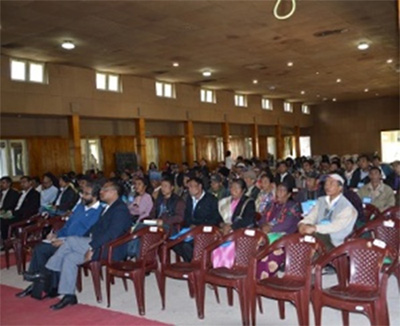
The future of medicinal and aromatic plants is of concern as they have always been used for many ailments in plants and livestock; however, they have not been used judiciously. A workshop was conducted as a detailed roadmap is necessary to sort out their conservation and use. The Bio Resource Development Centre (BRDC) in partnership with the Meghalaya Basin Development Authority (MBDA) along with CSIR-NBRI (Council of Scientific &Industrial Research -National Botanical Research Institute), had organized a workshop titled “Consultative workshop on conservation and promotion of medical and aromatic plants” to address this matter. The participants include local practitioners from around the state. The workshop was attended by Mr. R.G Lyngdoh, Vice Chancellor, Martin Luther Christian University who was also the chief guest, Mr. K.N Kumar, Principal Secretary to the Government of Meghalaya, C & RD, Mr. D. Ingty, Director of Horticulture, Mr. R.R.B.R Thabah, Director of BRDC and Mr. A.B.S Swer, Officer on Special Duty, Meghalaya Institute of Governance.
The key note address was given by Mr. R.R.B.R Thabah who spoke candidly on the traditional practitioners and their deep knowledge on plants to cure ailments in people and livestock. He expressed a concern on the ignorance on the value of medicinal and aromatic plants which was leading to their disappearance. This was resulting in having an adverse impact on the livelihood of traditional practitioners. Due to such reasons, Mr. Thabah articulated the need to organize a workshop to address these matters and put forward a plan where the local practitioners and the government could find a platform to facilitate convergence of minds and ideas and thus enabling judicious use of these herbs as well as conserving them for future generations. The workshop was thus organized to generate knowledge and find a framework for conservation of these herbs.
The next speaker was Mr. D. Ingty. He stated that this year was declared as the “year of family farming”. He spoke of the horticulture department and it convergence with other departments to provide a better livelihood for farmers. The horticulture was showing its support of the conservation of medicinal and aromatic plants by providing land for BRDC.
Mr. K.N Kumar passionately spoke at the event. He mentioned three thought that he wanted to share with the participants. The first was about the fact that he had been hearing about the potential of medicinal and aromatic plants for the past 25 years but nothing has happened. Local practitioners are located in remote corners and hence their knowledge is unknown to the public domain. Folk medicine is, therefore, becoming a lost art. He also stated that there was no compendium of herbal medicine in Meghalaya and this had to be the first step of BRDC, to publish an encyclopedia on herbal and folk medicine. He mentioned that there were no institutions in Meghalaya taking responsibility to document medicinal and aromatic plants and the onus in now on BRDC to step forward and take this responsibility.
His second point revolved around the concern that most of the knowledge in the field of medicinal plants and herbs is unverified. There are always stories of successful folk medicine in curing diseases but since they are not verified or documented, it is not amenable for repetition.
His third and final point was an example about Kerela and how it had been able to market itself as an ayurvedic haven. The success that Kerela found and created through an aggressive business model around ayurvedic medicine should be a model that the state should look at with keen interest with regards to medicinal and aromatic plants.
Mr. R.G.Lyngdoh commented on the fact that this should be a workshop and not a talk shop. He mentioned that it was necessary to document the plants available in Meghalaya. He strongly stated that allopathic medicine should not stake a claim over the domain of healing people but should make allowances for traditional practitioners to enter the main stream medical practice. He stated that allopathic comes at a premium and folk medicine can be an excellent alternative, cheap and safe. He declared the workshop open.
After the inauguration function, the participants along with members of CSIR-NBRI, Botanical Survey of India and NEHU, who are specialists in the field of medicinal plants and herbs, discussed matters on how to forge a framework to protect, conserve and sustain the use of medicinal and aromatic plants.
The presentations were presented by the participants the following day where all the points discussed were consolidated and an action plan and road map was formulated. A documentary on BRDC was screen at the end of the programme.